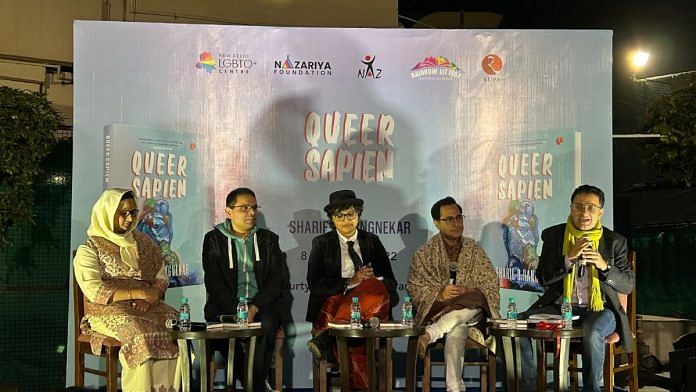At the launch of book Queer Sapien in South Delhi’s Gulmohar Park club on Thursday, audience and panelists agreed that the elite attitude towards queer literature has marred its reach.
Published by Rupa Publications, Queer Sapien is Sharif D Rangnekar’s second book in which he tries to explain what queerness is about. His first book was named From Gay to Normal. Through Queer Sapien, the author tries to tell the readers that queerness is where limits end. He explains the impacts of neoliberalism, politics and media on inner life through his experiences.
One of the panelists, transwoman Dr Aqsa Shaikh, confessed that this book introduced her to Indian queer literature, which casts questions on the limited reach of the extant literature. A large onus of this was also put on the media, which according to Sharif had failed miserably in introducing LGBT issues to the country.
Language of constitution, queerness
When asked whether the author was happy with the way Indian media reported the Section 377 judgment, Sharif said, “When it came to 377, the press did what it really does well, fail. It failed miserably in explaining what the order was all about. I had no problems with the headlines saying ‘love at first right’, but I do have a problem when the order had nothing to do with love. It had nothing to except the fact that we (homosexuals) could have sex and not put behind the bars. There was so much in the views of the judges in the judgement, which the media didn’t carry out.”
Saurabh Kirpal, a senior advocate at the Supreme Court of India and the author of Sex and the Supreme Court added that this also had to do with the way the judges wrote in their judgment while decriminalising homosexuality.
He said, “When lofty ideas are used in a judgment, when the ideals are represented and the promise of the moral authority of the Supreme Court, the language of the constitution, finds its way in the language of the judgment, it uplifts every citizen reading it. While the language is beautiful, full of hope and promise, the generic problems I have with them are two-fold. One, the prolixity of judgments — extremely lengthy and difficult to follow, which is the second problem — written in English and never translated in the vernacular languages. While the words of the language are beautiful and uplifting to anyone who reads it, how many people could read? It’s written in English and it’s a 500–700-page tomb. I think the time has come that we maybe simplify judgments and translate it into vernacular languages and let people read it.”
Debolina Dey, professor of English at Delhi University’s Ramjas College added that the word ‘queer’ itself hasn’t found itself a proper Hindi translation.
Also read: Delhi University is the new battleground for queer students—stigma, suppression and suicide
South Delhi affair
The audience nodded and applauded. The conversations, both on and off stage were in English. At coffee conversations, the audience of the houseful show seemed peculiar. The atmosphere was colourful with members of LGBTQIA+ community. Transgender men and women, people with coloured hair, men not concealing hickeys on their necks, scarves and shawls — the crowd gave a queer vibe. Most of them were in their thirties and forties, including rare Gen Z faces. In the end, it was a south Delhi event where the south Delhi people talked to other south Delhi people about making their ideas accessible to ‘ordinary’ folks.
The book, as described by the panellists, is eloquently written in a lucid format and is “not preachy”. One of the audience members recommended that it would have to be translated into regional languages to reach every common household, otherwise it would only remain a south Delhi/south Bombay affair.
(Edited by Ratan Priya)



